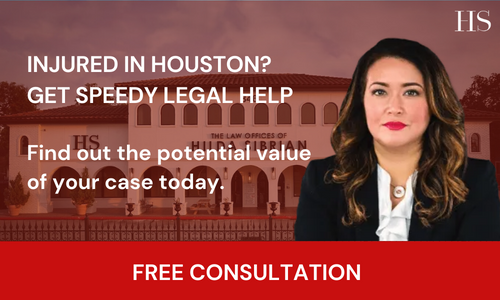Hearing loss can happen to anyone, regardless of age, gender, culture, or profession. And such a tragedy can occur suddenly as a result of an accident.
If you or a loved one suffer from hearing problems due to an accident, the injury lawyers at Hilda Sibrian® are experts in winning maximum compensation for you. Call us at 713-714-1414 or request a free consultation online.
However, our commitment continues after winning your case. At the Law Offices of Hilda Sibrian™, we deeply care about the human dimension of accident cases and support victims throughout their recovery to ensure they have the necessary tools to move forward with their lives alongside their loved ones.
With this in mind, we offer you a practical survival guide in case of hearing loss due to an accident.
What to do in case of hearing loss?
Sudden hearing loss is an injury that radically impacts a person’s life. In addition to affecting the ability to work, it can cause a series of social limitations:
- Reduction in the ability to communicate with others
- Difficulty or impossibility to enjoy:
- Gatherings
- Phone calls
- Concerts
- Movies
- Sports events
- Need to adapt to new communication methods (such as lip reading) and transform the ways of interacting with other people.
Having to face this complications and challenges usually bring new emotional and psychological distress for people who suffer from hearing loss, for example:
- Anger
- Anxiety
- Sadness
- Despair
If medical specialists and their own families do not adequately and timely address them, these feelings derived from hearing loss can become serious illnesses that put the person’s life at risk, such as:
- Depression
- Mental stress
- Development of phobias
To inform people with hearing loss about the best practices to face their suffering, strengthen self-understanding and promote acceptance from their families, coworkers, and loved ones at the Law Offices of Hilda Sibrian™, we share the following recommendations.
Tips for combating emotional struggles with hearing loss
Dealing with hearing loss is a long and complex process, with good and bad days.
On good days, one has the courage to go out and lead a normal life with enough energy to face and overcome obstacles in daily communication that may arise.
On bad days, however, one may feel the urge to stay in bed and feel deep sadness towards any mishap or lack of understanding in social situations.
Therefore, it is important to keep in mind these tips for combating the emotional struggles associated with hearing loss:
- Surround yourself with empathetic people who understand your condition; make sure your immediate environment is sensitive and tolerant of hearing loss.
- Seek out groups where you feel comfortable sharing your feelings and listening to others talk about similar struggles.
- Understand that from a social standpoint, hearing loss is a difficult condition to grasp, but with the necessary patience to explain it to others, it is possible to create sensitivity and collective awareness.
Do not try to hide your hearing loss
Many things can be done to improve the life of someone with hearing loss. But the first step is to acknowledge your condition and, from the acceptance, build the best possible conditions to move forward.
To achieve this, it is important to:
1. Not hide your hearing loss from others. If you have hearing problems, you may not be able to follow conversations clearly and may stop responding or give erratic answers. This is normal. But if you hide your condition, the people you interact with may think your behavior is due to:
- Hostility
- Disinterest
- Insensitivity
- Lack of empathy
- Incompetence
And these impressions can lead to social isolation. Therefore, it is essential not to hide your hearing loss.
2. Inform others how to achieve effective communication. It is not only important not to hide your hearing loss, but it is also crucial to explain it. In other words, share your struggles with your family, colleagues, friends, and people you interact with and show them how it is easier for you to establish effective communication.
How to find the ideal medical care for hearing problems?
Many things can be done to combat hearing loss, but the first step in being able to carry them out is to detect the exact condition and the appropriate treatment. In this regard, many people with hearing problems wonder, “how to find the ideal medical care?” Here are some recommendations:
- It is essential that your healthcare provider treats you with respect and kindness, makes you feel comfortable, and inspires confidence.
- Your doctor should offer several consultations and (if necessary) different devices to improve your hearing. They should also closely monitor your progress to determine which options work best.
- Make sure your doctor knows where to repair or replace the device you request to acquire (for example, a hearing technology device).
- Your doctor should pay attention to everything you explain. It is their obligation to listen to any discomfort you have and analyze it in order to offer solutions.
- If possible, look for a healthcare provider who offers consultations near your home. Hearing loss treatments can last for several months or years, and it is practical to be able to receive consultations in a place that does not require you to make long trips.
How to resume your social life after sudden hearing loss?
It is common for people who lose their hearing to constantly have to remind, even people in their own family, what are the ways to establish effective communication, and they may frequently ask people to speak louder or pronounce more slowly.
These situations can be annoying and stressful. However, the healthiest approach is to face them with a lot of patience and even with a bit of humor.
Technology has developed highly effective hearing support devices that, however, could be more effective in separating all the sounds in the environment. For example, when different sound events occur at the same time, it is likely that the devices will not allow each auditory stimulus to be isolated and received clearly.
Regarding this, there are a series of recommendations that can facilitate social interactions for people with hearing problems:
- Choosing restaurants or meeting places with facilities that isolate them from external noise.
- Sitting in places with a good view of everyone in a group (round tables help).
- Asking people to speak one at a time and avoid overlapping different conversations.
- Being in a well-lit place to be able to read the lips of people who are speaking.
- If you doubt what someone has said, confirm with others if what they heard is correct.
- If you must receive or share important information, do it in writing.
- Try to keep no more than 6 feet between you and your interlocutor.
You are not alone
Hearing loss is not an individual problem but a collective one. Therefore, it is not just about you and your hearing loss but also about a social issue related to empathy and awareness.
Never forget that you are not alone and do not have to face hearing loss in isolation. It would be best to involve your family, colleagues, and friends in different aspects of your daily life.
And if your condition was caused by an accident, you are not alone from a legal standpoint either: The lawyers at Hilda Sibrian® have been winning substantial settlements for accident victims for over 18 years and are ready to seek justice in your case.
Ten important facts about hearing loss in the United States
A report jointly prepared by the Hearing Loss Association of America, the National Institute on Deafness and Other Communication Disorders, and the Hearing Health Foundation offers these ten significant statistics about hearing loss in the United States:
- Approximately 48 million adults in the United States suffer from hearing problems.
- Hearing loss is a significant public health issue, as evidenced by the fact that it is the third most common physical condition among adults, behind arthritis and heart disease.
- 3 out of every 1,000 babies are born with a serious hearing problem.
- The two most common causes of hearing loss in adults are noise and aging.
- Noise-induced hearing loss can be of two types: sudden or cumulative over several years of exposure to loud noises (e.g. on a construction site or at an airport).
- On average, 4,000 new cases of sudden hearing loss are reported yearly (of which only 15 percent know the cause).
- People with mild hearing problems are twice as likely to develop dementia, and this likelihood increases as hearing loss becomes more severe (although there are therapies that can effectively combat this trend).
- Men are more likely to develop hearing loss than women.
- Depression and isolation are common conditions developed by people who have lost their hearing.
- Continuous exposure to tobacco smoke has been directly associated with a propensity to suffer from hearing problems.
What types of accidents can cause hearing loss?
Sudden hearing loss can occur in everyday situations such as car accidents, which is common in densely populated cities like Houston.
Although crashes are not usually associated with ear conditions, the reality is quite different, as evidenced by the fact that sensorineural hearing loss can be caused by several factors that frequently occur in traffic accidents, such as:
1. Brain contusion
Brain contusions occur when the head violently impacts an object (such as the windshield) in a car accident and can cause:
- Damage to the inner ear, mainly to the tissue, membranes, and hair cells.
- Ruptured eardrum.
- Disruption of the auditory flow to the cochlea (an important part of the inner ear located in the temporal bone).
2. Whiplash
One of the most common neck injuries that can occur in a crash, is whiplash, which occurs when tendons and muscles are stretched too far. When the impact is too intense, the damage can extend to the ears and cause conductive hearing loss.
3. The sound of the airbag deploying
When a car’s airbag deploys under pressure after a severe car accident, it can produce a sound that reaches 170 decibels, which is louder than a plane taking off. Exposure to such a loud sound can cause sudden hearing loss in one or both ears.
What are the legal rights of people with hearing problems?
To prevent hearing problems and contribute to the construction of a more compassionate and sensitive society towards people who have suffered hearing loss, as well as defend their rights, the federal government of the United States published through the Federal Register (official dissemination body) a series of rules and regulations, that include:
- Regulations on the maximum decibels allowed in different public mass events, such as concerts, fairs, festivals, or nightclubs.
- The obligation in certain entertainment events to include subtitles in various languages (such as in movie screenings).
- Information on other factors besides the intensity of a sound that contributes to causing hearing loss (specified in section 21 of the document).
- Obligation in certain government offices, public establishments, bus stations, or airports to include relevant information in writing on various screens or signs that are located in an easily visible place.
Who should you turn to if you lose your hearing in an accident?
If you or a loved one is experiencing hearing problems as a result of a crash, the auto accident lawyers at Hilda Sibrian® are experts in winning you a wide range of compensation that will allow you to:
- Cover all medical and rehabilitation expenses.
- Receive reimbursement for all wages the victim lost due to their injuries (in cases of hearing loss, they may include lifetime pensions).
- Be compensated for pain and suffering.
Call us at 713-714-1414 or request a free consultation online. The lawyers at Hilda Sibrian® are ready to defend you in your accident case and achieve justice in your hearing loss case due to an accident.
If you found this article interesting, you may also want to check out:








